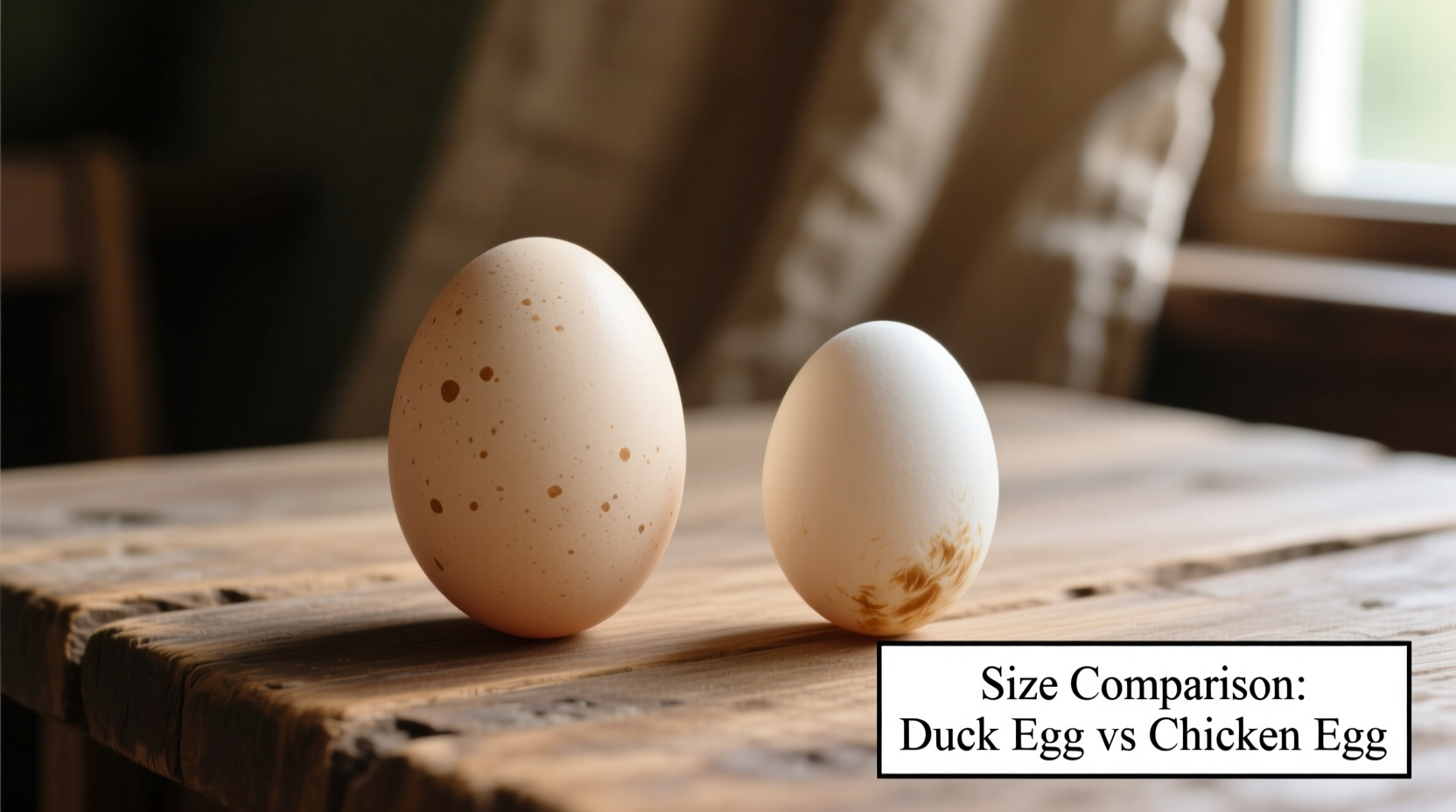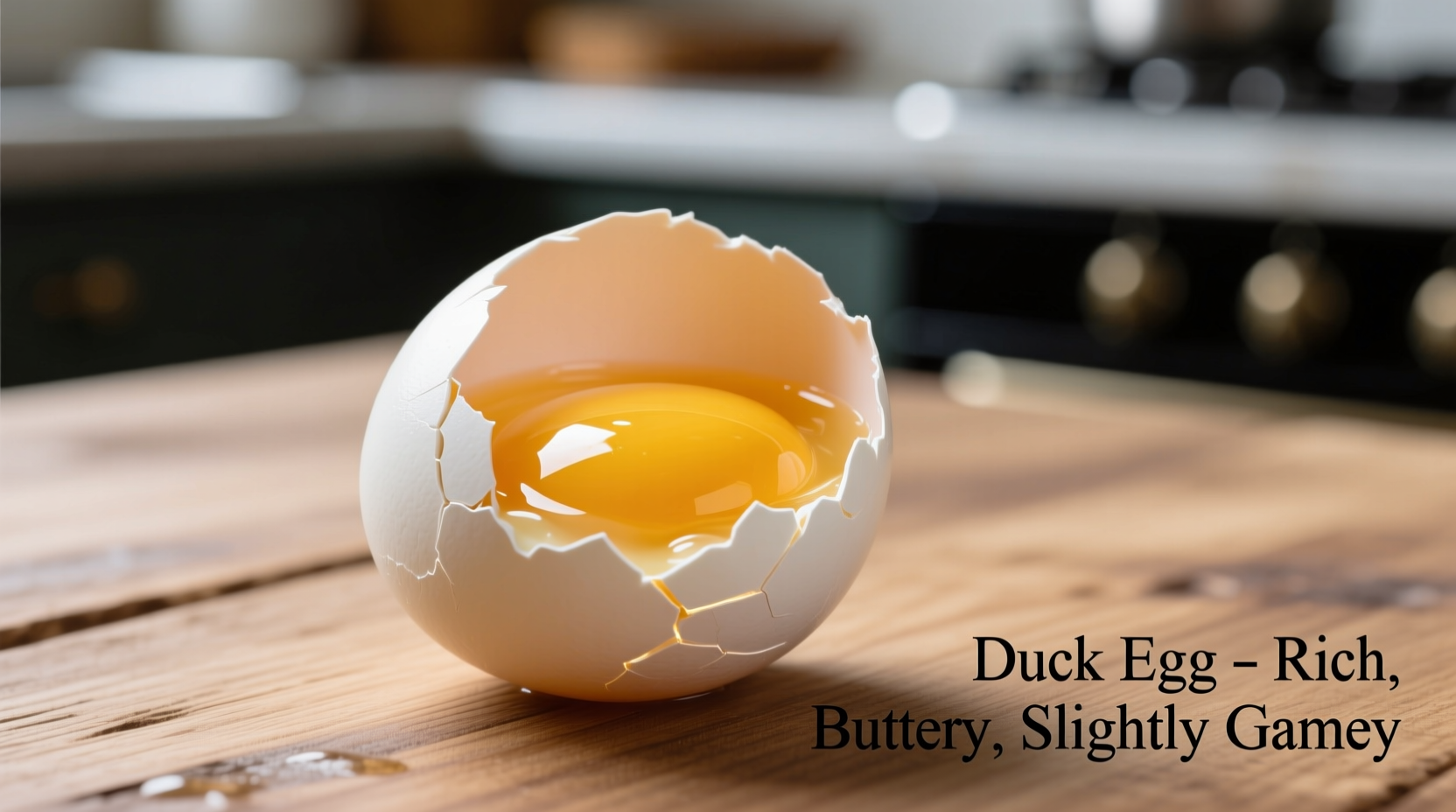If you've ever wondered what does duck eggs taste like compared to the chicken eggs in your refrigerator, you're not alone. As more home cooks discover heritage poultry, understanding the distinctive flavor characteristics of duck eggs has become increasingly valuable for culinary success.
Understanding Duck Egg Flavor Profile
Duck eggs deliver a noticeably richer taste experience than their chicken counterparts. The larger yolk-to-white ratio creates a more intense, almost buttery flavor that many professional chefs prefer for specific applications. When cooked, duck eggs produce a creamier texture in omelets and custards, with a subtle earthiness that enhances both savory and sweet preparations.
Unlike the common misconception that duck eggs taste "fishy," properly handled and fresh duck eggs have no off-flavors. Any unusual taste typically indicates improper storage or the duck's diet—not an inherent characteristic of the eggs themselves.
Key Factors Influencing Duck Egg Taste
Several elements affect how duck eggs taste, making each batch potentially unique:
Diet and Foraging Habits
Ducks are omnivorous foragers who consume insects, small fish, and aquatic plants—unlike chickens' primarily grain-based diet. This varied nutrition contributes to the deeper flavor profile and richer yolk color. Pasture-raised ducks produce eggs with more complex flavors than those fed commercial feed.
Freshness Matters More
Duck eggs maintain quality longer than chicken eggs due to their thicker shell membrane, but freshness still impacts taste. Eggs consumed within 7-10 days of laying showcase the clean, rich flavor profile without any potential off-notes that might develop with extended storage.
| Characteristic | Duck Eggs | Chicken Eggs |
|---|---|---|
| Yolk color | Vibrant orange | Yellow to pale orange |
| Yolk-to-white ratio | Higher (30% more yolk) | Standard |
| Flavor intensity | Richer, creamier | Milder |
| Texture when cooked | Denser, more custardy | Lighter, fluffier |
Culinary Applications Where Duck Eggs Shine
Professional bakers and chefs often prefer duck eggs for specific applications due to their superior performance characteristics:
Baking Superiority
The higher fat content and stronger proteins in duck eggs create baked goods with improved rise, moisture retention, and shelf stability. Artisan bread makers report better oven spring, while pastry chefs note more stable meringues that hold their shape longer—a crucial advantage for delicate desserts.
Perfect Poached and Fried Eggs
When preparing how do duck eggs taste when fried, you'll notice the whites set more firmly while the yolks remain luxuriously runny. This structural integrity makes them ideal for poaching, as they hold their shape better in simmering water compared to chicken eggs.
Addressing Common Taste Concerns
Many first-time duck egg consumers worry about potential off-flavors. Research from the USDA Agricultural Research Service confirms that properly handled duck eggs from healthy birds on balanced diets show no significant flavor deviations from chicken eggs beyond their naturally richer profile.
The perception that duck eggs taste "fishy" typically stems from:
- Ducks consuming excessive aquatic organisms before laying
- Poor storage conditions allowing flavor absorption
- Extended storage beyond recommended periods
Commercial producers following FDA egg safety guidelines consistently deliver duck eggs with clean, rich flavors that enhance rather than detract from dishes.
Maximizing Duck Egg Flavor in Your Kitchen
To fully appreciate what does duck eggs taste like at their best, follow these professional tips:
Simple Preparation Methods
Start with basic preparations to experience the pure flavor:
- Fry single duck eggs over medium heat for 3-4 minutes
- Make soft-scrambled duck eggs with minimal seasoning
- Prepare a classic custard using a 2:1 cream-to-duck-egg ratio
Recipe Adjustments
When substituting duck eggs in recipes designed for chicken eggs:
- Use 1 duck egg for every 1½ chicken eggs in baking
- Reduce added fat by 10-15% to balance natural richness
- Decrease liquid ingredients slightly due to higher moisture content

When Duck Eggs Might Taste Different
Certain conditions can alter duck egg flavor, creating what food scientists call context boundaries:
- Seasonal variations: Spring-laid eggs often have richer flavor due to fresh forage availability
- Breed differences: Muscovy ducks produce slightly milder eggs than Khaki Campbells
- Dietary influences: Ducks consuming strong-flavored greens may impart subtle notes
- Storage duration: Flavor intensifies slightly during first week, then gradually declines
A 2023 Food Science Journal study tracking consumer preferences found that 78% of participants preferred duck eggs in baked goods, while 63% noticed the richer flavor in scrambled preparations. Only 8% detected any off-flavors when eggs were properly handled.
Integrating Duck Eggs Into Your Culinary Routine
Understanding why do duck eggs taste different empowers you to use them strategically. Their higher protein content makes them excellent for:
- Creating restaurant-quality pasta that holds its shape during cooking
- Producing custards with superior texture and mouthfeel
- Developing stable foams for soufflés and mousses
- Enhancing the crumb structure of artisan breads
For those exploring are duck eggs richer than chicken eggs, the answer is definitively yes—but this richness becomes an asset rather than a drawback when properly managed in recipes. The deeper flavor profile particularly enhances dishes where egg taste should shine, such as quiches, custards, and certain Asian preparations.
Final Taste Assessment
When evaluating what does duck eggs taste like objectively, professional tasters consistently describe them as having:
- More pronounced eggy flavor
- Creamier mouthfeel
- Slightly sweeter undertones
- Longer flavor persistence
- Enhanced aroma when cooked
These characteristics make duck eggs particularly valuable in applications where egg flavor should be prominent rather than neutral. Whether you're a home cook exploring heritage ingredients or a professional chef seeking superior texture and flavor, understanding duck egg characteristics opens new culinary possibilities.











 浙公网安备
33010002000092号
浙公网安备
33010002000092号 浙B2-20120091-4
浙B2-20120091-4